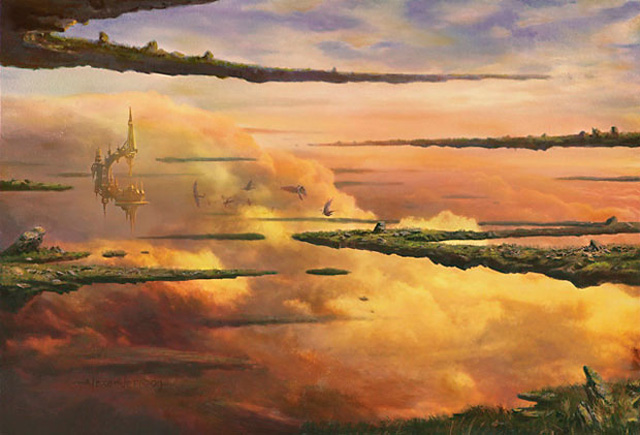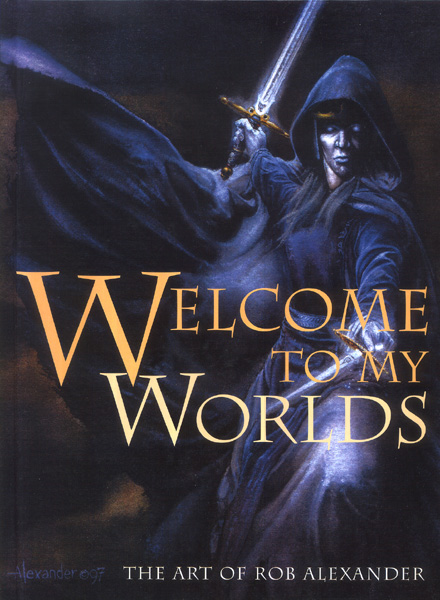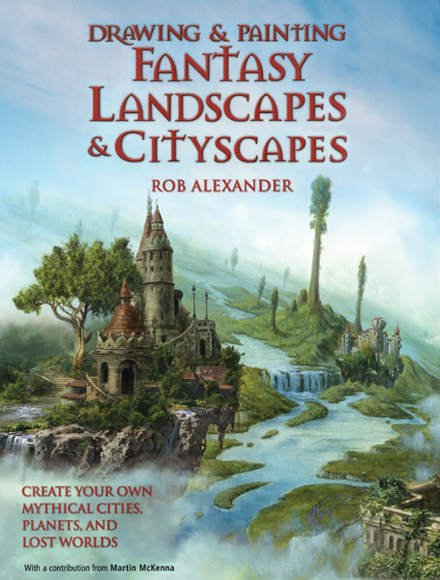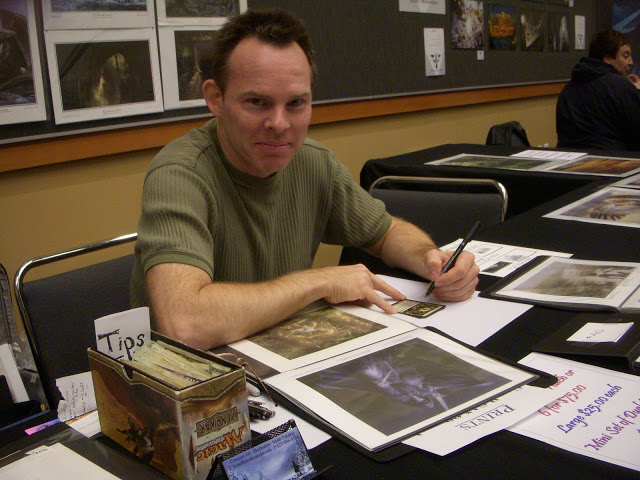
Sanctum of Serra by Rob Alexander
The burden of Magic celebrityhood rests parenthetically on Rob Alexander’s shoulders, if it’s there at all. Despite being one of the most famed MTG artists for doing all the original Ravnica shock lands and some of the Alpha duals, Rob is all-quiet-work-ethic at his artist booth at StarCityGames: Seattle, leaving the ephemeral fae of fame, fortune, and pride to flit uncertainly around his shoulders, puzzled by his confident humility.

Spectral Cloak by Rob Alexander
Born in Ontario, Canada, Rob says he was heavily influenced by Lord of the Rings. His FAQ web page (which I highly recommend reading) reflects the introspective, yet open-book nature I found to be characteristic of the artist when I met him in person. He lists Spectral Cloak and Underground Sea as favorite MTG pieces from early days, and Temple Garden and Overgrown Tomb more recently.

Underground Sea by Rob Alexander
This is the inaugural article in my 7 Questions (with MJ) artist interview series. I couldn’t have imagined a more nuanced and enlightening interview than this one with Rob to kick off the festivities. I hope you enjoy his responses as much as I did.

1. What’s your favorite song and why?
Hard to pick one, but if I have to, I'm going to say "The Taxi Ride" by Jane Siberry, off the album The Speckless Sky. Why is easier. I love female vocalists, and being Canadian, I find that Canadian singers in particular seem to resonate with me. I also love soft, slow, sad music, and this is one of the saddest songs I know. Someone once asked me if I take pleasure in others’ pain. Quite the opposite. In all of the sad songs I like, there is also a seed or grain of hope, or forgiveness, of passion and life. This song is no exception, being about the realization that someone loved you only because you wanted them to, but also realizing you love them enough to set them free, to find for them someone they can love.
I spend most of my waking hours alone, working on art. I was never one to talk for hours on end everyday on the phone while I work, and for most of my career, I was in a room with no windows, no TV, and no Internet—just some music and a lot of painting supplies. I listened to a lot of sad, slow songs because I found that there was almost nothing separating me from the performers’ lives and experiences, and it made me feel less isolated and alone and reminded me of the world that existed beyond my walls. It was a connection to the real world while I existed in the worlds of my imagination.

After the Fall (a.k.a. Stomping Ground) by Rob Alexander
2. What is your first memory "as an artist"?
That one is easy, as there was a very clear, clean, and precise moment and memory when I decided to become an artist and chose it as a career. I was just eighteen and at my first science fiction convention. I volunteered to run the art show (thankfully, there were several folks who knew what they were doing who helped me, or it would have been a total debacle!). I put several paintings of mine up for sale and sold one. Let’s be honest, it was not a great painting. It would be overly generous to even call it mediocre, but it was mine. Painted just because I wanted to and because it made me feel good. When it sold (for $20, which barely covered the cost of the frame and the 16" × 20" canvas), I felt such a sense of legitimacy, of validation. Someone else liked this piece enough to part with cold hard cash in order to take it home. That was the moment when I knew the crazy stuff in my head could reach other people, that they could get a glimpse of what was inside me, and that at least some of them liked it and responded to it. I knew at that point that it was both possible for me to be a professional artist and that there was nothing else I wanted to do.

Dragon Songs by Rob Alexander
3. If you had not pursued art, what would you have done with your life professionally?
Biochemistry. Specifically, working on the human genome project, specializing in either cloning or disease research. I always loved science and math, did a lot better in those subjects in school than I ever did in art, and was very seriously considering the science route after high school.
4. What do you eat and drink when no one's watching?
Hmmm . . . you’re asking what my favorite naughty snacks are—those self-indulgences we all have that we know we shouldn't. I have an overly strong fondness for Fritos corn chips, so I only buy them about once a year (never did suffer a lack of will or an addictive personality . . . ). I am also very fond of a late-night glass of red wine, with a slice of good bread, some cheese (preferably goat or sheep’s milk), and maybe a bit of roast beef or steak sliced very thin. Lastly, Triscuit crackers and hummus. That's my favorite snack after I work out.
5. What brand of shoes are you wearing?
Boots, not shoes, and they are District 3.

Breeding Pool pencil study by Rob Alexander
6. For those considering a life in art, how would one know if he/she is an artist and is truly well-suited to this profession?
I think you need a few things. The ability of focus on what you are doing to the exclusion of all else, a belief in yourself that you're right and that what you're doing is worth it, despite what anyone else thinks, a mind that is always curious and questing, and an odd balance of accepting input from others about your art and refusing it. There are times we need another set of eyes and times we need to stick to our guns. For the challenges, a teacher of mine put it this way once, and I think she was right. She said, "If you like the idea of being one of twenty guys at a dance with only one girl, you'll do fine.”

Squadron Hawk by Rob Alexander
There are a lot of other painters out there, so you need to find that immovable spot in yourself that will buck the odds, the trends, and know to the core of your being that what you have to say and do is every bit as valid as anyone else's. Once you find that, it gets easier. Not easy, but easier. The technical can always be taught, hours and hours at the drawing board will polish your skills, but you have to have that source of conviction and strength in order to pick yourself up every day and paint. Especially when art directors look at your work and say things like, "You can paint Coke, but can you paint Pepsi?"

7. If you had to paint your favorite animal, in your favorite color, what would you paint?
Have to go with not only my favorite animal, which is man’s best friend, the humble dog, and with the Newfoundland in particular. I would love to see one in a deep red-brown, like a cross between a chocolate lab and an Irish setter. Except it needs to have white around the paws and feathers on the legs . . .

Rob eludes the hubris faeries with grace while not missing a beat in his work.
In putting together this article, I found a lot of inspiration in Rob’s responses as they might pertain to other pursuits, such as competitive Magic or writing. His advice is solid. His work is, with its trademark lush tension between darkness and hope, breathtaking. If you have the chance to shake his hand in person, do. If you have the chance to buy one of his pieces, do. Class and classically beautiful art never go out of style. Much thanks to Rob Alexander for his time and thoughtful responses.
Till next time, may Magic be your boots of conviction.
-MJ























